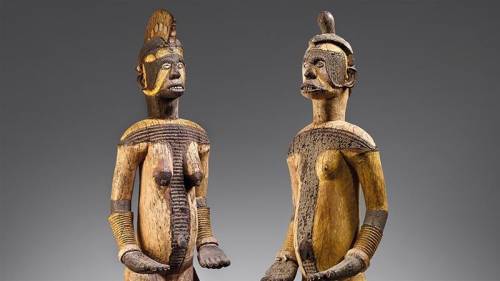These artworks are stained with the blood of Biafra’s children,” wrote Chika Okeke-Agulu, an art history professor at Princeton, in an impassioned Instagram post three weeks ago calling for a halt to the sale of two wooden statues made by the Igbo people of Nigeria.
Mr. Okeke-Agulu believes the items were looted in the late 1960s during the country’s brutal civil war. But the auction went ahead on Monday at Christie’s in Paris, New York Times reports.
The life-size male and female figures, described by Christie’s as “among the greatest sculptures of African art,” sold to an online bidder for 212,500 euros with fees, about $238,000. The price was well below the pre-sale estimate of €250,000 to €350,000.
The sculptures originated from southeast Nigeria, a region devastated by one of the late 20th century’s bloodiest civil conflicts. Biafra’s unsuccessful three-year struggle to gain independence, which ended in 1970, claimed the lives of more than a million people, most of whom died of starvation.
Mr. Okeke-Agulu, who grew up in the Biafra war zone, near where the statues were made, said in his Instagram post that Christie’s Igbo figures were among many artefacts stolen by intermediaries at the behest of European and American dealers and collectors, such as the renowned French collector Jacques Kerchache.
Christie’s named Mr. Kerchache, who was instrumental in the foundation of the Quai Branly Museum, which displays artefacts from France’s former colonies, as a former owner of these sculptures.
The auction house said that the collector acquired them from an African dealer in 1968 or 1969, either in Cameroon or Paris, before they were later acquired by another private collector, who was the seller on Monday.
In a statement before the auction, Christie’s responded to Mr. Okeke-Agulu’s Instagram post, saying the sale of the statues was legitimate and lawful.
“There is no evidence these statues were removed from their original location by someone who was not local to the area,” the statement said, adding that Mr. Kerchache never went to Nigeria in 1968 or 1969 and Christie’s had worked to reassure all enquiries regarding the provenance and legitimacy of the sale.
Mr. Okeke-Agulu’s voice is one of many calling for the repatriation of African artworks in European and American collections that are thought to have been acquired through colonial exploitation or illegal looting.





























